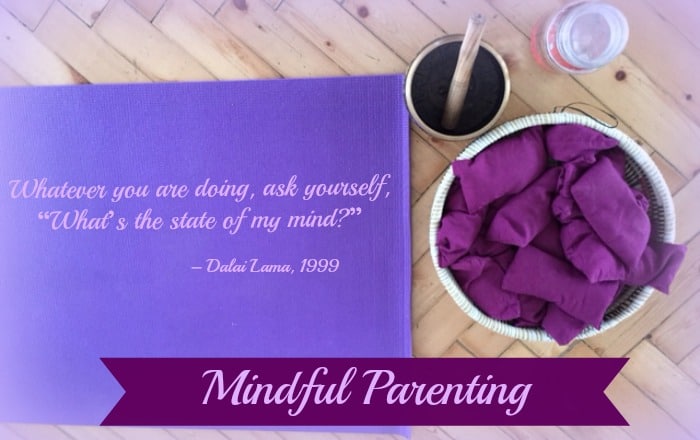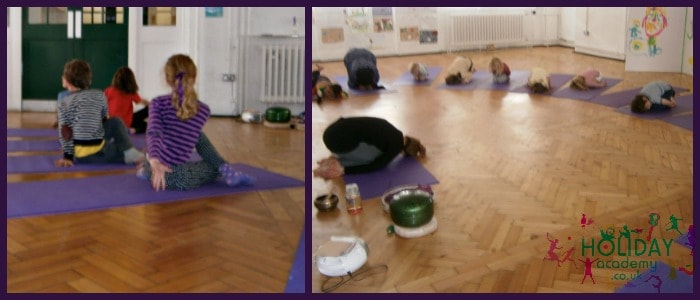One of the things we love most about our Holiday Academy yoga and mindfulness sessions for kids is the fact that children of any ability and fitness level can participate. Movements are slow and methodical which helps even the most hyperactive children to learn the art of focus and concentration. We are proud to offer our yoga workshop for kids which is led by the yoga Alliance accredited Children’s Yoga Teacher, Anita Looby. Anita is a master at Yoga and Mindfulness and has been working with school children and with a number of after school groups. More information here
What is mindfulness?
Mindfulness is said to have originated in Buddhist thinking and mediation practice over two and a half thousand years ago. Its original purpose was to address and relieve self-induced suffering caused by the dysfunctional ways people habitually tend to respond to their experiences. During 1970s research findings confirmed that meditation can reduce unhealthy psychological problems and has since then been used in treatments for stress, chronic pain, anxiety, depression, borderline personality disorder, eating disorders and addiction.
Mindfulness training emphasises focused attention to internal and external experiences in the present moment of time. Research has shown that this type of training also can be beneficial in everyday life. Children can be more focused on the present than adults, they can focus attentively on a game or activity. They feel their emotions immediately, even if they sometimes have difficulties verbalising those feelings. However, children also live in a world of being told what to do, what time to wake up, what time to go to school, what to eat, etc. Their lack of agency may lead to going through the motions of their daily tasks without conscious awareness of what they are doing. With mindfulness training we can teach children to being to pay attention to the things in the present moment that they have not noticed before.
Mindfulness is about being fully aware of living right now, in this moment. However, in this stressful world it can be hard to stay ‘in the moment’ as most of us spend they day rushing in between appointments and ‘musts’. Mindfulness training will help you to stay in the present and pay attention to the here and now. Being in the present moment help us to cope better with our lives and brings happiness into our daily routines. Mindfulness is also about accepting who your are so you can keep focus on the important things in life. Thus, practicing mindfulness has been proven to help to focus and pay attention, both for adults and children.
Mindfulness for kids
Mindfulness can help children thrive at school. Most of the research on mindfulness has been conducted in school settings and recent studies have shown that school with mindfulness programs to be effective in reducing symptoms of depression, stress and anxiety. Such programs can also help students focus during exams, as well as reducing stress and boosting happiness among high school students. It has also been proven to be an effective intervention for children with autism. With autism (and many other psychological imbalances) it can be a challenge to balance the inner and outer world which can distort relationships and interactions with others. Environmental cues can become so amplified that the child shuts down from the world to protect themselves. Mantra meditation (a type of meditation that involves repetition of a word or a sound) can have a harmonising and balancing effect and children with autism have responded very well to mantra because it facilities response.
Mindful Parenting
Mindful parenting encourages children to self-actualise it involves paying attention to your child and your parenting in a particular way, intentionally, here and now, and non-judgmentally. It is about healing the home environment and healing relationships.
To begin incorporating mindfulness into your children’s life start with daily mediation, yoga or breathing practices. Family dinners can also become mindful by not allowing phones at the table and having a moment of gratitude for the food. Even simple things like positive affirmations and encouraging children to think before they speak can foster an environment of calmness, presence and compassion.
How to teach mindfulness at home
Here are five main tenets of mindful parenting by Carolyn Gregoire:
- Make space for just being, every day.
Our lives are lived in moments, mindfulness training can teach your child to live in those moments. Mindful parenting depends on being more presents, so establishing a daily mindfulness practice is considered key. Simply sit for 5-30 minutes every day, at the same time and place, bringing awareness to the breath in the body as a natural. physical, felt experience. When the mind wonders, don’t make it a problem. Simply notice when this is happens, let of of that thought and gently bring your awareness back to the mind/body connection. The greatest gift you can give your child is your full presence. You must start with your self to teach your child mindfulness.
- Mindfully manage your stress
Parents are often living their lives running on empty, over scheduled, in a constant state of low-grade to high-grade stress. As a result it is hard to be “in the moment” when spending precious time with your children. As the mind/body connection becomes strengthened through mindfulness practice, it becomes possible to actively track and notice stress or imbalance in the body/mind. And you can actually shift from a mindlessly reactive and stressed mode to a mindfully responsive mode by using the STOP acronym below.
S – Stop. Whenever you notice stress or imbalance, simply pause in awareness.
T– Take a breath. Simply bring your awareness into the breathing body, just letting the sensations of the breath move into the forefront. Also, notice how your mind begins to settle a bit, bringing more clarity. When we are stressed, we can’t think clearly or see any situation accurately.
O– Observe. Just notice how the breath begins to naturally bring balance to the systems of the body. Let this be felt. Also, look around. What is really happening, in the moment?
P– Proceed. Having shifted to a more mindfully responsive mode, take an action that is more skill-full appropriate and best attuned to your situation.
- Embrace the model of the “good enough’ parent
Parents often feels the pressure of being the “perfect” parent. Mindful parenting embraces the reality and wisdom of the “good enough” parent, acknowledging that regardless of our best intentions, moments of imperfection and failure are unavoidable. Your children need to see to fail at times, otherwise your children are not given an authentic model of what it is like to be human and that s ok to fail. What is important is that you show that when these inevitable moments of imperfection and failure occur, they become opportunities for compassion, learning, repair, forgiveness, humour, honesty and kindness. It goes without saying that this needs to be conveyed in developmentally appropriate ways.
- Honour your children’s sovereignty
Honouring your children’s sovereignty is not about giving them unbridled freedom or too many choices. It is about bringing more awareness to your unmet needs, agendas, issues, unfinished business and thwarted dreams, so it does not get project on to your children. We need to take responsibility for what is unfinished in us, rather than burdening our children. Can we truly see, value and love our children as they really are, different and quite separate from us? Many parent/child conflicts involve a lack of clear boundaries and emotional separation on the parent’s part. What they need and what we need, can often be at odds. The idea is to learn to acknowledge and address all these needs with more skill, understanding and grace in mindful awareness.
- Cultivate kindness and compassion
Nothing is more humbling, more challenging and more heartbreaking than parenting. There is no quitting and no hiding and no “finish line.” Therefore, as an act of self-preservation, parents must learn how to actively cultivate kindness and compassion in the moment. Mindfulness practice is often referred to as an act of “self-love” or ongoing “self-parenting.”
Children are in need of unconditional love from their parents, but you can’t give that to your child if you are running on empty. Therefore, we must begin with ourselves, experiencing more and more kindness, compassion and self-acceptance. And as a result, this begins to naturally flow to your children.
Books on Mindful parenting
References:

